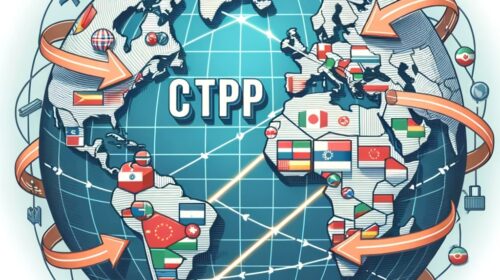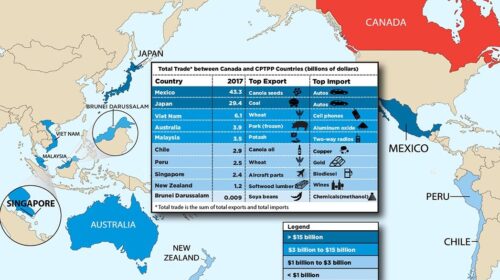CPTPP: top 10 benefits for the UK
CPTPP: top 10 benefits for the UK
(31.03.2023)
1. A gateway to growth
CPTPP is a vast free trade bloc consisting of 11 sovereign countries spanning the Asia Pacific and the Americas. It is a gateway to the wider Indo-Pacific region, which will account for the majority of global growth and around half of the world’s middle-class consumers in the decades to come. Joining will strengthen our ties with some of the world’s most dynamic economies, with a combined GDP of £11 trillion once the UK joins.
CPTPP was created to expand and as it grows the UK will stand to benefit from access to new markets. Economies including Costa Rica, Ecuador and Uruguay have formally applied to join CPTPP. Thailand, the Philippines, and South Korea have also expressed an interest in joining. If these economies were to join CPTPP with the UK, the combined GDP would increase to just over £13 trillion, an expanded group which covered 10% of all UK exports in 2021. Accession puts the UK at the heart of a dynamic group of sovereign countries, including Vietnam which is predicted to be one of the fastest growing economies in the next decades.
2. Opening new markets for UK services providers
CPTPP is one of the most modern trade agreements in the world, with ambitious services provisions that are ideally suited to the UK; the world’s second largest service provider. The UK already sells more services than we do goods to CPTPP members, worth £31.9 billion, including £2.3 billion in business services such as auditing, accounting and legal services to Australia, £1.3 billion in transportation services to Singapore, and £1.4 billion in insurance services to Canada.
Red tape will be slashed and UK businesses will be operating on a par with local firms, bringing new benefits to the UK businesses like greater certainty around licensing procedures and ensuring independent and impartial regulators. Companies such as Standard Chartered and their clients are likely to benefit from smoother access to markets such as Singapore, Malaysia and Vietnam.
3. Data flows
Digital trade is creating a new global economy, with remotely delivered services from the UK to CPTPP worth £20.5 billion in 2020. Data flows are vital for modern trade, enabling everything from more efficient manufacturing and supply chains to more reliable infrastructure. Joining CPTPP will help remove the barriers our companies face like data localisation requirements, ensuring data can flow between the UK and CPTPP members.
The City of London Corporation says accession to the bloc will help the UK become a leader in digital trade, with modern rules on data and freer access to each other’s services sectors. The bloc is committed to the highest data protection standards so British business can expand into CPTPP markets with confidence, ensuring that individuals and businesses know their data and intellectual property are safe.
4. Benefitting UK exporters: cutting tariffs on goods exports
Over 99% of our goods exports to CPTPP member countries will be eligible for zero tariffs, improving goods market access for British firms. Businesses selling key UK exports such as cars and machinery will benefit from the removal of tariffs. In the long run, joining CPTPP could lead to a £1.7 billion boost to UK exports to other CPTPP countries. Exporters of dairy products, including cheese and butter, will get greater access to lower tariffs in Canada, Japan and Mexico, building on the £23.7 million of dairy products we exported to these countries in 2022; and exporters of chocolate will benefit from zero tariffs on exports to Mexico and Malaysia.
The removal of tariffs should also help UK businesses, such as Derbyshire-based Denby Pottery, be more competitive and reach CPTPP’s vast consumer base. Companies like the Conker Distillery could gain from new opportunities to export their Conker Coffee Liqueur.
5. Benefitting UK exporters: new opportunities from diversifying supply chains
Diversifying British supply chains will give businesses the ability to increase economic resilience by deepening our trading links across the Asia-Pacific and Americas. Modern ‘rules of origin’ should make British businesses more competitive by allowing them to trade more freely across the bloc and take advantage of new export opportunities. For example, UK automotive manufacturers could sell car engines tariff-free to a car maker in the bloc, who could then sell their cars tariff-free to any member country. This will also help exporters diversify their supply chains, making it easier for companies to buy and use raw materials from across the bloc.
6. Benefitting the whole of the UK
CPTPP will support jobs and create opportunities for UK businesses in every part of the UK, from beverage producers in Scotland, to manufacturers of machinery in Wales, to car manufacturers in Northern Ireland and the West Midlands. Total UK exports to CPTPP countries were worth £60.5 billion in the 4 quarters to the end of Q3 2022.
Joining the bloc will help companies like Wales-based AI company, AMPLYFI, reach new markets through CPTPP’s ambitious services and digital provisions. CPTPP could also benefit companies including Northern Ireland-based Lowden Guitars and Scotland-based Cyacomb to grow their exports to new markets.
7. A trade deal with Malaysia for the first time
CPTPP goes above and beyond the existing FTAs that we have with most CPTPP members. And joining CPTPP means the UK will have a trade deal with Malaysia, a CPTPP member, for the first time. This will give UK businesses much better access to an economy worth £271 billion in GDP in 2021, which will support jobs across key sectors in the UK and could boost our services exports to Malaysia which were worth £1.4 billion in the 4 quarters to the end of Q3 2022.
Tariffs of around 80% will be eliminated on UK exports of whisky to Malaysia over time, helping the UK to get a larger share of the market. UK car manufacturers will also benefit from the staged removal of tariffs of up to 35% on UK exports of cars to Malaysia. UK businesses like Sheffield-based chilli paste manufacturer Mak Tok could benefit as it seeks greater access to the Malaysian market.
8. More access to high-quality consumer goods
As a member of a bloc where most goods imports are eligible for zero tariffs, consumers and businesses could benefit from better choice, quality and affordability. This should include cheaper import prices for high-quality consumer goods like fruit juices from Chile and Peru, honey and chocolate from Mexico, and vacuum cleaners from Malaysia.
It could also lead to cheaper import prices for inputs to manufacturing with tariffs eliminated on a wide range of inputs, including machinery and chemicals. Greater access to global supply chains is an important source of competitive advantage for businesses.
9. Strengthening economic security
The UK is helping to ensure its future economic security by joining one of the world’s most dynamic trading blocs while protecting our sovereignty. As CPTPP grows, the UK will help shape its development to fight unfair and coercive trading practices that threaten the future of international trade. British businesses will benefit from enhanced access to more markets while trading under fair rules that allow them to compete and thrive on the global stage.
10. Encouraging investment
In 2021, the level of investment from CPTPP countries in the UK was around £182 billion, accounting for at least 9% of the total UK inward investment. Investment from CPTPP countries supported the creation of over 5,000 new jobs in 2021/2022. Being a member of CPTPP encourages further investment by guaranteeing protections for investors, supporting jobs across the UK.
CPTPP’s rules will help protect UK investors from unfair, arbitrary or discriminatory treatment and enable them to access a modern, transparent dispute settlement mechanism in case these rules are broken. Investors in the UK, including Japanese company Fujitsu, which employs more than 7,000 people in the UK, say CPTPP will help to strengthen the UK’s relationship with countries like Japan.





